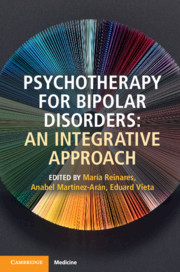Book contents
- Psychotherapy for Bipolar Disorders: An integrative approach
- Psychotherapy for Bipolar Disorders
- Copyright page
- Contents
- Collaborators
- Preface
- Part 1 An Introduction to Treatments
- Part 2 The Foundations of an Integrative Approach to Bipolar Disorders
- Chapter 2.1 Psychoeducation for Patients and Family Members
- Chapter 2.2 Promotion of a Healthy Lifestyle
- Chapter 2.3 Mindfulness
- Chapter 2.4 Cognitive and Functional Remediation
- Part 3 An Integrative Approach to Bipolar Disorders
- Book part
- Bibliography
- Index
Chapter 2.1 - Psychoeducation for Patients and Family Members
from Part 2 - The Foundations of an Integrative Approach to Bipolar Disorders
Published online by Cambridge University Press: 18 October 2019
- Psychotherapy for Bipolar Disorders: An integrative approach
- Psychotherapy for Bipolar Disorders
- Copyright page
- Contents
- Collaborators
- Preface
- Part 1 An Introduction to Treatments
- Part 2 The Foundations of an Integrative Approach to Bipolar Disorders
- Chapter 2.1 Psychoeducation for Patients and Family Members
- Chapter 2.2 Promotion of a Healthy Lifestyle
- Chapter 2.3 Mindfulness
- Chapter 2.4 Cognitive and Functional Remediation
- Part 3 An Integrative Approach to Bipolar Disorders
- Book part
- Bibliography
- Index
Summary
Every illness represents in some way a threat and increases the sense of vulnerability. The diagnosis of a chronic and recurrent mental disorder influences a person’s self-image and has a strong impact on all members of the family. In the adjustment to the diagnosis, each individual usually undergoes a process in which a variety of beliefs and emotions may arise that will have to be dealt with, in parallel to education about and acceptance of the disorder. It is common for denial to appear first, attributing what has happened to external factors. There is also a tendency for the patient to deny the chronic nature of the disorder, refusing the possibility that another episode may occur. The onset of the disease can often be accompanied by a marked sense of loss, experienced both by the person receiving the diagnosis and by his or her relatives: the loss of the healthy self together with an increase in the feeling of vulnerability, real losses as a consequence of the episodes (work is impaired, social difficulties arise, ruptures occur, family are affected, financial problems ensue, etc.) or perceived loss, sometimes erroneously, of expectations about the person him- or herself or about the future.
- Type
- Chapter
- Information
- Psychotherapy for Bipolar DisordersAn Integrative Approach, pp. 17 - 30Publisher: Cambridge University PressPrint publication year: 2019

